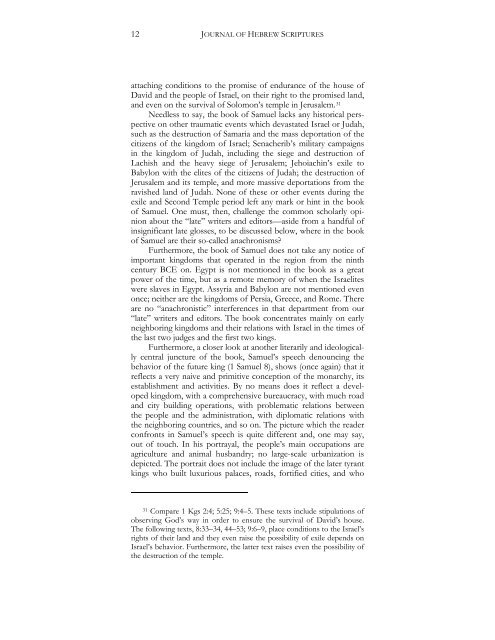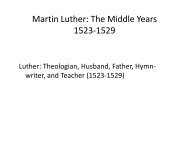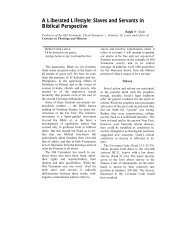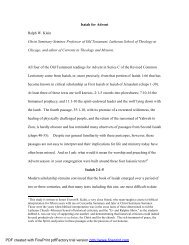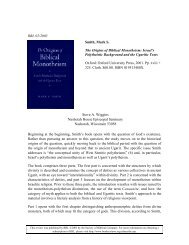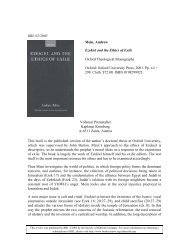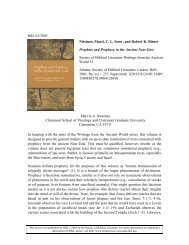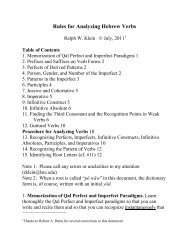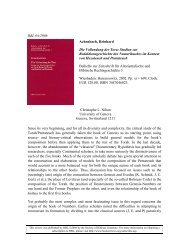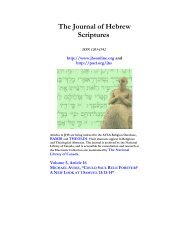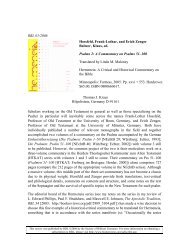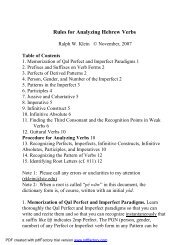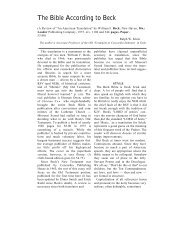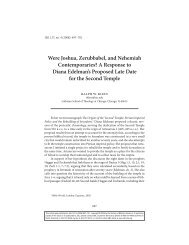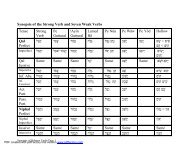The Book of Samuel: Its Composition, Structure and Significance as ...
The Book of Samuel: Its Composition, Structure and Significance as ...
The Book of Samuel: Its Composition, Structure and Significance as ...
Create successful ePaper yourself
Turn your PDF publications into a flip-book with our unique Google optimized e-Paper software.
12 JOURNAL OF HEBREW SCRIPTURES<br />
attaching conditions to the promise <strong>of</strong> endurance <strong>of</strong> the house <strong>of</strong><br />
David <strong>and</strong> the people <strong>of</strong> Israel, on their right to the promised l<strong>and</strong>,<br />
<strong>and</strong> even on the survival <strong>of</strong> Solomon’s temple in Jerusalem. 31<br />
Needless to say, the book <strong>of</strong> <strong>Samuel</strong> lacks any historical perspective<br />
on other traumatic events which dev<strong>as</strong>tated Israel or Judah,<br />
such <strong>as</strong> the destruction <strong>of</strong> Samaria <strong>and</strong> the m<strong>as</strong>s deportation <strong>of</strong> the<br />
citizens <strong>of</strong> the kingdom <strong>of</strong> Israel; Senacherib’s military campaigns<br />
in the kingdom <strong>of</strong> Judah, including the siege <strong>and</strong> destruction <strong>of</strong><br />
Lachish <strong>and</strong> the heavy siege <strong>of</strong> Jerusalem; Jehoiachin’s exile to<br />
Babylon with the elites <strong>of</strong> the citizens <strong>of</strong> Judah; the destruction <strong>of</strong><br />
Jerusalem <strong>and</strong> its temple, <strong>and</strong> more m<strong>as</strong>sive deportations from the<br />
ravished l<strong>and</strong> <strong>of</strong> Judah. None <strong>of</strong> these or other events during the<br />
exile <strong>and</strong> Second Temple period left any mark or hint in the book<br />
<strong>of</strong> <strong>Samuel</strong>. One must, then, challenge the common scholarly opinion<br />
about the “late” writers <strong>and</strong> editors—<strong>as</strong>ide from a h<strong>and</strong>ful <strong>of</strong><br />
insignificant late glosses, to be discussed below, where in the book<br />
<strong>of</strong> <strong>Samuel</strong> are their so-called anachronisms?<br />
Furthermore, the book <strong>of</strong> <strong>Samuel</strong> does not take any notice <strong>of</strong><br />
important kingdoms that operated in the region from the ninth<br />
century BCE on. Egypt is not mentioned in the book <strong>as</strong> a great<br />
power <strong>of</strong> the time, but <strong>as</strong> a remote memory <strong>of</strong> when the Israelites<br />
were slaves in Egypt. Assyria <strong>and</strong> Babylon are not mentioned even<br />
once; neither are the kingdoms <strong>of</strong> Persia, Greece, <strong>and</strong> Rome. <strong>The</strong>re<br />
are no “anachronistic” interferences in that department from our<br />
“late” writers <strong>and</strong> editors. <strong>The</strong> book concentrates mainly on early<br />
neighboring kingdoms <strong>and</strong> their relations with Israel in the times <strong>of</strong><br />
the l<strong>as</strong>t two judges <strong>and</strong> the first two kings.<br />
Furthermore, a closer look at another literarily <strong>and</strong> ideologically<br />
central juncture <strong>of</strong> the book, <strong>Samuel</strong>’s speech denouncing the<br />
behavior <strong>of</strong> the future king (1 <strong>Samuel</strong> 8), shows (once again) that it<br />
reflects a very naive <strong>and</strong> primitive conception <strong>of</strong> the monarchy, its<br />
establishment <strong>and</strong> activities. By no means does it reflect a developed<br />
kingdom, with a comprehensive bureaucracy, with much road<br />
<strong>and</strong> city building operations, with problematic relations between<br />
the people <strong>and</strong> the administration, with diplomatic relations with<br />
the neighboring countries, <strong>and</strong> so on. <strong>The</strong> picture which the reader<br />
confronts in <strong>Samuel</strong>’s speech is quite different <strong>and</strong>, one may say,<br />
out <strong>of</strong> touch. In his portrayal, the people’s main occupations are<br />
agriculture <strong>and</strong> animal husb<strong>and</strong>ry; no large-scale urbanization is<br />
depicted. <strong>The</strong> portrait does not include the image <strong>of</strong> the later tyrant<br />
kings who built luxurious palaces, roads, fortified cities, <strong>and</strong> who<br />
31 Compare 1 Kgs 2:4; 5:25; 9:4–5. <strong>The</strong>se texts include stipulations <strong>of</strong><br />
observing God’s way in order to ensure the survival <strong>of</strong> David’s house.<br />
<strong>The</strong> following texts, 8:33–34, 44–53; 9:6–9, place conditions to the Israel’s<br />
rights <strong>of</strong> their l<strong>and</strong> <strong>and</strong> they even raise the possibility <strong>of</strong> exile depends on<br />
Israel’s behavior. Furthermore, the latter text raises even the possibility <strong>of</strong><br />
the destruction <strong>of</strong> the temple.


